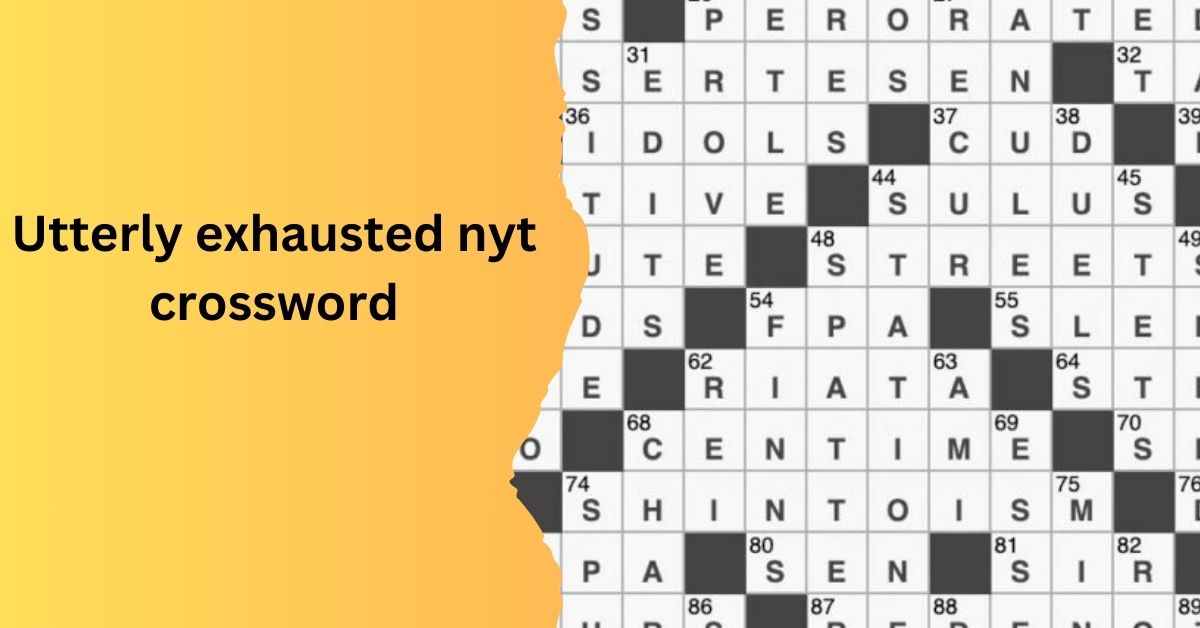
Crossword enthusiasts around the world often find solace and challenge in the pages of The New York Times. The NYT crossword has become a daily ritual for many, testing their linguistic prowess and mental agility. However, for those who have encountered the phrase “utterly exhausted NYT crossword,” the challenge takes on a whole new dimension. In this article, we will delve into the intricacies of the Utterly Exhausted NYT Crossword, exploring clues, answers, and strategies for overcoming the mental fatigue associated with these puzzles.
Table of Contents
ToggleThe Art of the Crossword
A. Crossword Puzzles – A Timeless Tradition: Crossword puzzles have been a staple in newspapers for over a century. The NY Times, in particular, has gained a reputation for its sophisticated and challenging puzzles. The grid of black and white squares hides a world of words waiting to be uncovered, making it an enduring and beloved pastime.
Understanding Crossword Clues
- The Puzzle Within a Puzzle: The heart of any crossword is its clues. These often cryptic and cleverly crafted hints guide solvers toward the correct answers. However, in the case of an “utterly exhausted NYT crossword,” decoding these clues may feel like navigating a linguistic labyrinth.
- The Mind-Bending Wordplay: NYT crossword clues are renowned for their wordplay and linguistic gymnastics. Solvers must be adept at recognizing anagrams, puns, and other linguistic tricks. The mental acrobatics required to decipher these clues can contribute to the feeling of utter exhaustion.
The Challenge of Utterly Exhausted NYT Crossword Puzzles
Unraveling the Grid
- The Maze of Squares: The crossword grid, with its intersecting rows and columns, presents a formidable challenge. An utterly exhausted NYT crossword may be characterized by a grid that seems insurmountable, with each square a potential stumbling block.
- Decoding Clues and Finding Answers: Solvers may find themselves staring at seemingly inscrutable clues, unable to discern the words hidden within. The mental effort required to unravel these clues can lead to a state of profound fatigue, turning the crossword-solving experience into a battle of wits and will.
Strategies for Overcoming Exhaustion:
- Break It Down: When faced with an utterly exhausted NYT crossword, it’s crucial to break the puzzle down into manageable sections. Tackling smaller portions can make the overall task seem less daunting and help prevent mental burnout.
- Take a Break: Puzzles, especially those from The New York Times, can be mentally taxing. It’s okay to take breaks to refresh your mind. Stepping away from the puzzle for a few minutes can provide a new perspective and prevent frustration.
The Evolution of Crossword Solving
The Rise of Mini Crosswords
- A Quick Mental Workout: For those who find the traditional NYT crossword to be utterly exhausting, mini crosswords offer a brief yet satisfying mental workout. These condensed versions provide a welcome alternative for solvers looking for a less time-consuming challenge.
- Building Word Skills: Mini crosswords can be a stepping stone for novice solvers, helping them develop the essential skills needed to tackle the larger, more demanding puzzles. They serve as a gateway for building vocabulary and honing wordplay abilities.
Online Resources and Communities:
- The Digital Age of Crossword Solving: With the advent of online platforms, crossword enthusiasts can now access a plethora of resources to aid them in their solving journey. From crossword-solving apps to online communities, the digital age has transformed the crossword-solving landscape.
- Collaborative Solving: Utterly exhausted NYT crossword solvers can find support and camaraderie in online crossword communities. Collaborative solving, where enthusiasts pool their knowledge and skills, can breathe new life into the solving experience.
Overcoming Mental Fatigue
A. Mind Over Matter:
- Exercising the Brain: Solving crosswords, especially challenging ones like those from The New York Times, is an excellent way to exercise the brain. However, it’s essential to strike a balance and avoid pushing mental fatigue to the point of burnout.
- Incorporating Variety: To prevent crossword-induced fatigue, solvers can incorporate a variety of puzzle types into their routine. Exploring different crossword styles and difficulty levels can keep the mind engaged without succumbing to monotony.
B. Recognizing Patterns and Phrases
- Building Experience: Over time, experienced solvers develop a knack for recognizing common patterns and phrases in crossword clues. This familiarity can significantly enhance solving speed and reduce the mental strain associated with an utterly exhausted NYT crossword.
- Patience and Persistence: The journey of solving a challenging crossword is as much about patience as it is about skill. Recognizing that some puzzles may be more demanding than others and embracing the challenge with persistence can lead to a more fulfilling solving experience.
Conclusion
The “utterly exhausted NYT crossword” may present a formidable challenge, but it is within the grasp of determined solvers. By understanding the intricacies of crossword clues, utilizing effective strategies, exploring alternative puzzle formats, and leveraging online resources, enthusiasts can navigate the mental fatigue associated with these iconic puzzles. The key is to approach each crossword with a blend of enthusiasm, patience, and a willingness to embrace the mental workout that comes with decoding the linguistic marvels hidden within the grid.
